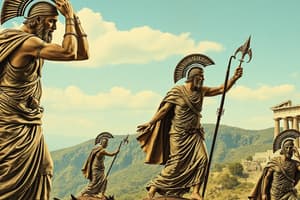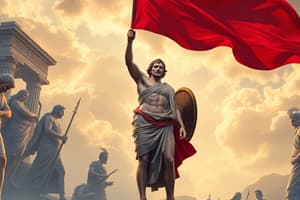Podcast
Questions and Answers
What characterized the city-states in Greece during the period before Christ’s birth?
What characterized the city-states in Greece during the period before Christ’s birth?
- Common politics and dialects with different religions
- No regional differences in politics or religion
- Unified religion and politics
- Different politics and dialects with no unified religion (correct)
What was the main similarity between the city-states in Ancient Greece?
What was the main similarity between the city-states in Ancient Greece?
- Shared religious beliefs (correct)
- Unified government systems
- Equal distribution of wealth
- Common languages and dialects
What is the 'Homeric Question' about?
What is the 'Homeric Question' about?
- The historical accuracy of Trojan War events
- The existence of Homer as an individual (correct)
- The authorship of the Iliad and the Odyssey
- The relationship between Greek and Roman literature
What is the Epic Cycle mainly about?
What is the Epic Cycle mainly about?
What triggers the start of the Trojan War according to the text?
What triggers the start of the Trojan War according to the text?
What is meant by 'oral tradition' as discussed in the text?
What is meant by 'oral tradition' as discussed in the text?
What concept from Freudian psychoanalysis is exemplified in the myth of Oedipus Rex?
What concept from Freudian psychoanalysis is exemplified in the myth of Oedipus Rex?
In the Persephone, Demeter, and Hades myth, which literary device is used to explain the changing seasons and harvest cycles?
In the Persephone, Demeter, and Hades myth, which literary device is used to explain the changing seasons and harvest cycles?
Which concept is illustrated by the story of the Judgment of Paris?
Which concept is illustrated by the story of the Judgment of Paris?
What literary approach emphasizes that the meaning of myths arises from their structural relations?
What literary approach emphasizes that the meaning of myths arises from their structural relations?
The Iliad is described as primarily about Achilles' anger (menin), which is characterized as a type of anger beyond human anger. What does this anger represent?
The Iliad is described as primarily about Achilles' anger (menin), which is characterized as a type of anger beyond human anger. What does this anger represent?
'Timé,' as referenced in the text about Achilles, represents which aspect of an individual's identity and reputation?
'Timé,' as referenced in the text about Achilles, represents which aspect of an individual's identity and reputation?
What is the significance of Aristeia in Ancient Greek heroism?
What is the significance of Aristeia in Ancient Greek heroism?
How do Achilles and Hector differ in their views on kleos?
How do Achilles and Hector differ in their views on kleos?
How are Paris and Hector contrasted in terms of their weaponry?
How are Paris and Hector contrasted in terms of their weaponry?
What is the main reason the Ancient Greek heroes are considered godlike?
What is the main reason the Ancient Greek heroes are considered godlike?
Why did Agamemnon taking Briseis affect Achilles so deeply?
Why did Agamemnon taking Briseis affect Achilles so deeply?
What role does Timé play in the lives of Ancient Greek heroes?
What role does Timé play in the lives of Ancient Greek heroes?
What is the meaning of 'nostoi' in the context of the Odyssey?
What is the meaning of 'nostoi' in the context of the Odyssey?
How is Odysseus described in the text?
How is Odysseus described in the text?
What is the main message of the Iliad according to the text?
What is the main message of the Iliad according to the text?
How does the Odyssey view the importance of coming home versus achieving great deeds?
How does the Odyssey view the importance of coming home versus achieving great deeds?
Why is Odysseus considered 'polytropos'?
Why is Odysseus considered 'polytropos'?
How does the text explain the differing messages of the Iliad and the Odyssey?
How does the text explain the differing messages of the Iliad and the Odyssey?
Why does Odysseus decide to leave Philoctetes behind on the island?
Why does Odysseus decide to leave Philoctetes behind on the island?
What convinces Philoctetes to agree to return to fight in the Trojan War?
What convinces Philoctetes to agree to return to fight in the Trojan War?
What role did Herakles play in convincing Philoctetes to join the war?
What role did Herakles play in convincing Philoctetes to join the war?
Why did the issue arise with Herakles' appearance in the play in Athens?
Why did the issue arise with Herakles' appearance in the play in Athens?
What flaw of Odysseus is highlighted by the interpretation of him playing Herakles in the play?
What flaw of Odysseus is highlighted by the interpretation of him playing Herakles in the play?
What was the role of Clymenestra in 'Iphigenia at Aulis' by Euripides?
What was the role of Clymenestra in 'Iphigenia at Aulis' by Euripides?
Study Notes
Ancient Greek City-States
- Characterized by independent governance, unique identities, and varying forms of political systems (e.g., democracy in Athens, oligarchy in Sparta).
- Shared similarities: common language, religious beliefs, cultural practices, and participation in the Olympic Games.
Literary Themes and Concepts
- The 'Homeric Question' addresses the authorship and origins of the works attributed to Homer, particularly the Iliad and the Odyssey.
- The Epic Cycle narrates the events before, during, and after the Trojan War, encompassing various heroic tales.
- The Trojan War was triggered by the abduction of Helen by Paris, leading to a conflict among the Greek city-states.
Myths and Oral Tradition
- 'Oral tradition' refers to the storytelling method used to pass down cultural tales and histories before written records existed.
- The myth of Oedipus Rex exemplifies the Freudian concept of the Oedipus complex, addressing themes of fate and familial relationships.
Seasons and Symbolism in Myths
- The myth involving Persephone, Demeter, and Hades employs allegory to explain the seasonal changes and agricultural cycles.
- The Judgment of Paris illustrates the concept of desire and competition among goddesses, leading to the Trojan War.
Mythical Structures and Heroism
- Structuralism emphasizes that the meaning of myths is derived from their relationships and contrasts within the narrative.
- Achilles' anger (menin) in the Iliad represents a deeper, almost divine fury that influences the fate of many characters.
- 'Timé' signifies honor and reputation, crucial aspects of identity for characters in Greek mythology.
Heroism and Kleos
- Aristeia refers to the moments of exceptional prowess and glory achieved by heroes in battle.
- Achilles seeks eternal glory (kleos), while Hector views it through the lens of fulfilling duty and honor to family and city.
- Paris, characterized by his reliance on a bow, contrasts Hector, who is depicted as a more traditional warrior with a sword.
Godlike Heroes and Personal Loss
- Ancient Greek heroes are viewed as godlike due to their extraordinary abilities, divine lineage, and interactions with gods.
- Agamemnon's taking of Briseis deeply affects Achilles, symbolizing a profound loss of honor and respect.
Nostalgia and Characterization
- 'Nostoi' refers to the themes of return and homecoming found in the context of the Odyssey.
- Odysseus is depicted as cunning, resourceful, and a complex hero navigating challenges during his journey.
Messages of the Iliad and Odyssey
- The Iliad conveys messages about the futility of war and the tragic consequences of pride and anger.
- The Odyssey highlights the value of homecoming over mere pursuit of glory and heroic deeds.
- Odysseus is considered 'polytropos' for his versatility and adaptability in facing various adversities.
Key Conflicts and Resolutions
- Odysseus abandons Philoctetes due to the latter's painful affliction, highlighting themes of sacrifice and strategic choices in war.
- Philoctetes is ultimately convinced to join the war through the intervention of Herakles' spirit, emphasizing divine influence in mortal affairs.
- The interpretation of Herakles' character in Athenian plays reveals flaws in Odysseus, showcasing themes of hubris and vulnerability.
Clytemnestra's Role
- Clytemnestra is a pivotal character in 'Iphigenia at Aulis,' showcasing themes of revenge and the consequences of sacrifices made by Agamemnon.
Studying That Suits You
Use AI to generate personalized quizzes and flashcards to suit your learning preferences.
Description
Test your knowledge on the qualities of Ancient Greek heroes such as Aristeia and Timé. Learn about what makes these heroes exceptional and godlike in their characteristics.




